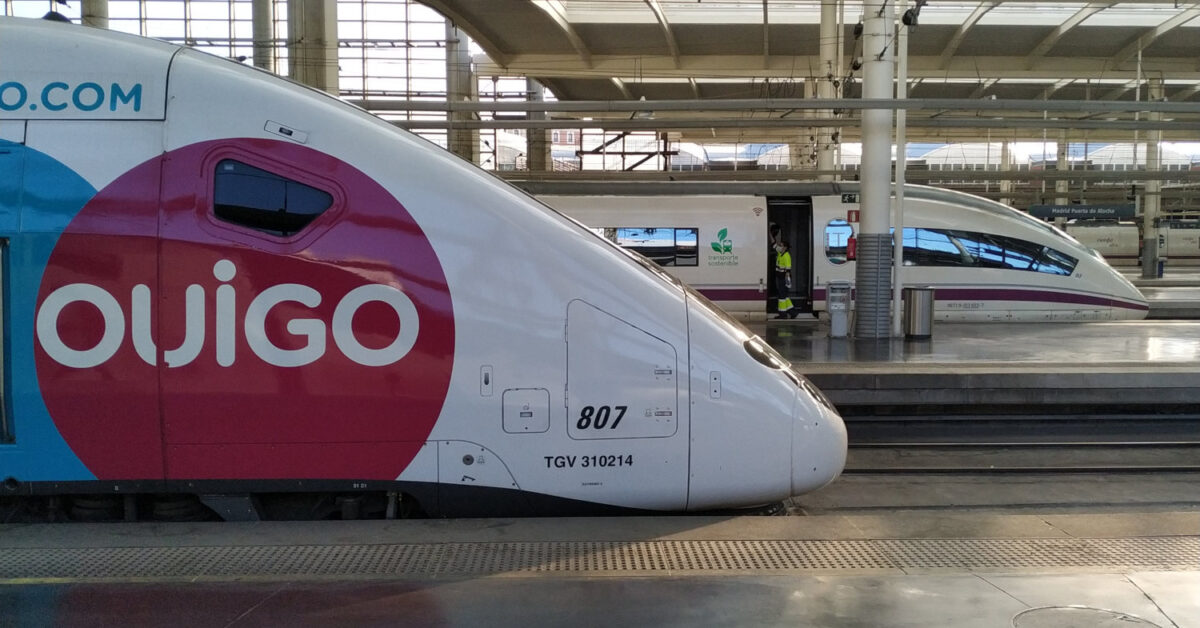Renfe and Ouigo Spain are embroiled in a fresh dispute over the Spanish operator’s maintenance depots, where Ouigo—SNCF’s Spanish low-cost subsidiary—carries out servicing on its fleet.
The row surfaced after Cadena SER obtained internal documents. Renfe’s president, Álvaro Fernández Heredia, expanded on these claims in an interview with Trenvista, to be published tomorrow.
He accuses Ouigo—lacking its own workshops—of abusing Renfe Fabricación y Mantenimiento’s facilities and breaching their contract. In particular, he alleges that Ouigo:
- Occupies 30 per cent more workshop capacity than requested and allocated.
- Treats heavy maintenance tasks as light maintenance, without authorisation, advance notice or correct fees.
- Submits maintenance plans that do not reflect actual work carried out.
Heavy maintenance sits at the heart of this latest clash, since Renfe is under no obligation to grant access for such tasks. Fernández Heredia reports that Renfe formally notified Ouigo of these irregularities in July.
In response, Ouigo is seeking a two-year extension of the current maintenance arrangement, arguing it is “essential to ensure continuity of the awarded services.” Renfe has rejected this proposal because the works “do not comply with the stipulated conditions of use,” while remaining open to further negotiation.
The Technical Dispute: Light vs Heavy Maintenance
The crux lies in differing interpretations of first-level (light or routine) and second-level (heavy or non-routine) maintenance. Under EU Directive 2012/34 and Spain’s Railway Sector Act, light maintenance covers routine, on-the-move tasks, whereas heavy maintenance involves non-routine overhauls requiring withdrawal of rolling stock from service. The EN 15380-4:2021 standard further specifies that heavy maintenance necessitates dismantling significant components, while light maintenance does not.
Renfe contends Ouigo has performed second-level tasks—such as bogie replacement and major wiring work—in workshops reserved only for routine operations, thus exceeding the scope of its entitlement.
Ouigo, however, defends its practice by citing the French maintenance schema of VL (Visite Limitée), VG (Visite Générale) and GVG (Grande Visite Générale). Only VL corresponds to light maintenance under EU rules, it insists, with VG and GVG being legitimate under its internal classification.
Why Ouigo Uses Renfe’s depots
Access to maintenance depots is a major barrier for new rail entrants. EU law mandates that depot owners—like Renfe in its role as maintenance‐infrastructure provider—offer workshop access to all operators on fair, transparent and non-discriminatory terms. Each operator must submit a maintenance plan to secure slot allocations for its maintenance provider (Alstom-Ateinsa in Ouigo’s case).
However, this statutory right extends only to light maintenance; heavy maintenance remains an ancillary service subject to the operator’s discretion and separate billing.
Ouigo’s alleged second-level works, performed beyond its time slots, have eroded capacity available to Renfe Viajeros and other open-access services such as Iryo.
Pathways to Resolution
Fernández Heredia argues the remedy is straightforward: Ouigo must align its maintenance plans with its allocated capacity and formally declare any heavy maintenance works, which would then attract higher auxiliary service charges. Renfe stands ready to accommodate second-level tasks, provided they are properly declared and billed. In 2024, Ouigo’s use of Renfe workshops generated €1.8 million for Renfe Ingeniería y Mantenimiento.
Ouigo, nonetheless, insists on retaining the current contract for a further two years and warns it may appeal to Spain’s National Commission on Markets and Competition if no agreement is reached.
Future Prospects
Currently, Ouigo services some of its fleet at Renfe’s Fuencarral, Cerro Negro and Can Tunis depots. Renfe has demanded a revised maintenance plan for 2025, stripping out undeclared heavy works. Ouigo remains willing to negotiate under a “good-faith and neutral” approach but reserves the right to involve the CNMC.
Despite the frictions, it seems unlikely that Ouigo will abandon the Spanish market solely over access to maintenance depots. Exiting would jeopardise its investment, breach its ADIF operating licence and invite penalties. Moreover, SNCF would face the logistical challenge of re-engineering its trains to meet French safety systems before repatriation. Ultimately, a negotiated settlement over workshop conditions appears the most pragmatic outcome.
